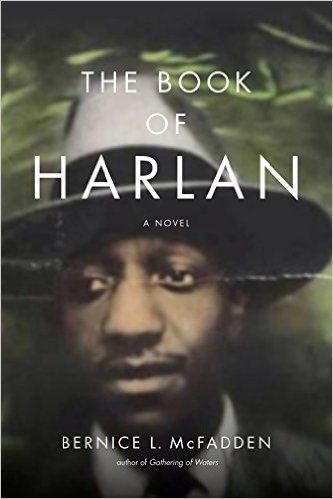
By: Bernice L. McFadden
Print Length: 354 pages
Publisher: Akashic Books; (April, 2016)
Reviewed by: Vickie Fang
The Book of Harlan, which begins in Georgia with the innocent longings of a preacher’s young daughter and ends in New York with an explosive outburst from an aging holocaust survivor, could serve as a how-to manual on making a wide swath of history both accessible and fascinating for a lot of people. Like almost all good works of historical fiction, it unites the great sweep of history with the struggles of very individualized characters who are far more interested in their own needs than the those of the larger world. The preacher’s young daughter dreams of stardom as a pianist, hardly imagining, or for that matter, caring, about the significance of the dawning jazz era. The holocaust survivor knows only his own pain, not the convulsions of a world at war. The reader, however, is able to enjoy both the large and small scale stories, told in short, vivid, explosive chapters made all the more interesting by the fact that, as a Black man, Harlan manages to inhabit both the wider worlds available to him as a musician and the narrow confines of Jim Crow.
The preacher’s young daughter is Harlan’s mother who leaves her comfortable, upper middle class home to marry a working man, soon finding herself in the only job available for a Negro woman, “weeping in shame over all those rich white people’s floors, silverware, and bed linen.” As she puts it, she “was raised in silk, now living in burlap.” When she does manage to come into some money, she moves with her husband and young son, Harlan, to New York where she remains on the periphery of the exploding worlds of Harlem’s jazz and swing scene. Her childhood friend, who has become a successful singer, lives nearby, and the two women resume a friendship that allows McFadden to tell a very urban story in a very down-home way. When the spoiled and thoughtless Harlan leaves high school to play guitar full time, the novel tells a personal story of dissolution while introducing a series of minor characters who are striving to create better lives for themselves.
Harlan gets his big break at the book’s midpoint — his youthful band is invited to perform in Paris. Only one person, a friend named Lizard, worries that February of 1940 is not a good time to go to France, and Lizard is overruled by his excited friends. Even after the Germans invade, Harlan never does understand the danger he’s in. Apparently, he has a great deal of company.
God cried. The dry bones of the devout crackled in the cemeteries, skies split, bled pink, and the devil wailed: Don’t worry tomorrow, live for today. Don’t just dip your toe, wade in. Discard your scarves, welcome the wind against your neck; let it rake its airy fingers through your hair. Leave your umbrellas at home, step out into the rain and get wet. Let the children have cake for breakfast, tell strangers you love them. Fuck, drink. Feed the pigeons fresh bread. These are the last days; there will be no weeping here because Montmartre is not a place of sadness or regrets, it’s a haven of art, freedom, and celebration, so revel, revel!
A long and powerful series of scenes follow, telling the rarely-imagined plight of a Black man in a concentration camp. Harlan returns home, but he will never be the same again. He will wander through the rise of the civil rights movement, the loss of his friends, his parents’ old age, and his own inheritance of the family home in Georgia. Driven by memories, powerful outside forces, and un-examined needs, Harlan could be a stand-in for most of humanity. When he lashes out in the end, McFadden unleashes a series of surprises that dazzle Harlan and the reader alike. It is a richly satisfying novel about a rather small man who perseveres through a great era.
